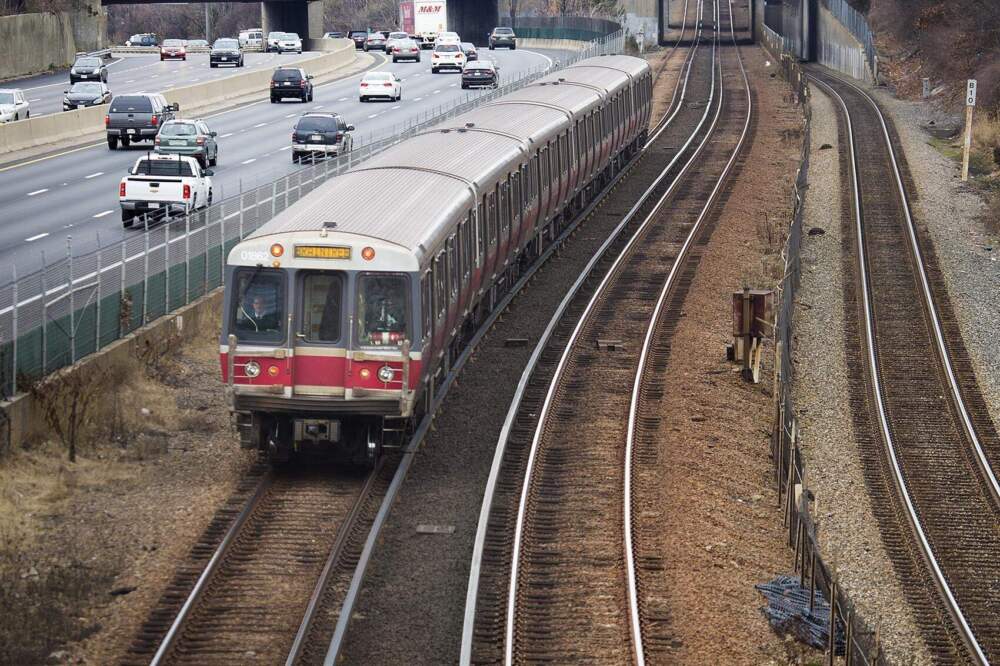Advertisement
Mass. has a transportation funding problem. A new task force is supposed to solve it

Massachusetts faces a litany of financial questions related to funding critical infrastructure like roads, bridges and public transit. The MBTA is hurtling toward a fiscal cliff. Meanwhile, gas tax revenue — which provides money for transportation projects — may drop off as the state moves toward electric vehicles.
To address these challenges, Gov. Maura Healey recently signed an executive order to create the Transportation Funding Task Force. It's charge? To make recommendations for a long-term transportation finance plan by the end of the year.
"I want them looking at everything — everything that will help us get to a place where we have a long-term sustainable plan for financing transportation in this state," Healey told WBUR's Radio Boston. Healey's order last month came alongside her state budget proposal, which included several transportation-related investments.
The task force is expected to review current and projected sources of revenue. The group will also consider a variety of funding sources "whether it’s congestion pricing, tolling or other creative funding options," a MassDOT spokesperson told WBUR.
"We are not looking at funding a particular project or closing a particular fiscal year’s budget," the MassDOT spokesperson said. "This group is looking at the next 10 to 20 years as to how we are going to pay for safe, reliable and equitable transportation options."
This isn't the first time a group has been convened to tackle transportation issues. In 2004, the legislature created a transportation finance commission. That led to some reforms, but other recommendations like tying the gas tax to inflation were shot down by the Legislature. More recently, lawmakers have also tried to implement congestion pricing and a tax on vehicle miles traveled, but both were vetoed by former Gov. Charlie Baker.
Transit advocates say they welcome this new focus on long-term transportation funding.
"I do have faith that Gov. Healey and [MassDOT] Secretary Tibbits-Nutt do actually want to solve the problem," Transit Matters executive director Jarred Johnson said.
The group will include several top state officials, including in transportation and economic development, as well as business leaders.
Some advocates worry the task force won't have a diversity of voices.
"The text itself of the [executive order] shows us that it's weighted heavily on secretariats and the business sector," said Reggie Ramos, the executive director of Transportation for Massachusetts. "This signals a lot about who gets to give recommendations and what groups are represented."
Ramos said the disability community, organized labor, and communities of color are not properly accounted for in the task force's composition.
"Identifying funding sources and creating revenue that is equitable and not regressive can only truly happen in inclusive conversations that center the lived experiences of the most impacted by transportation policies," Ramos said.
The executive order outlines one spot for an organization that "represents low-income urban communities that have historically been underserved by transit." There is also one spot for an organization that represents low-income rural communities underserved by transit.
"We want people who have not been represented in this conversation around transportation," a MassDOT spokesperson said, adding that the administration is also engaging different regions, businesses and cities "that have not been at the table."
Members of the task force are expected to be sworn in and meet at the end of the month, according to the MassDOT spokesperson.
While the task force will focus on funding for transportation overall, it comes at a critical time for the MBTA as it faces a major funding crisis. The T has estimated it will cost 24.5 billion to bring the system into a state of good repair. And the transit agency expects a budget gap between $573 million and $656 million for fiscal year 2025, which starts in July 1. That budget gap will likely widen in subsequent years, according to the MBTA's own projections.
The T has been saddled with debt tied to the Big Dig, and the revenue it gets from the state sales tax — which the agency heavily relies on — hasn't provided sufficient funding over the years, MBTA CFO Mary Ann O'Hara told the agency's board last month.
"The T has been starved for money," O'Hara said to the board.
The MBTA's situation offers a glimpse into some of the financing problems Healey's task force will need to grapple with as the group tries to come up with long-term funding solutions for various modes of transportation across the state.
